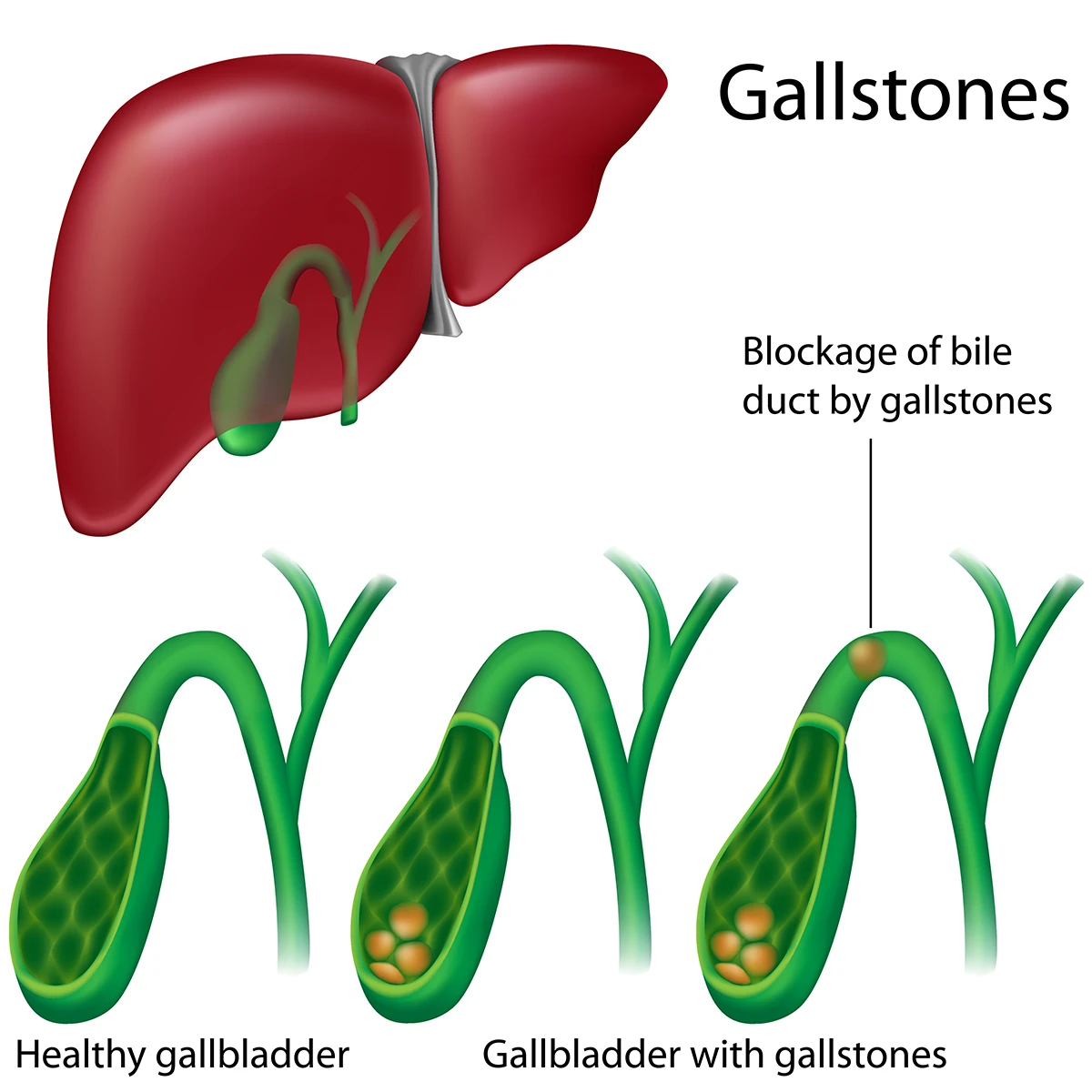Gallstones
Your gallbladder is like that behind-the-scenes worker that quietly does its job without clamoring for attention. While it’s handy, your gallbladder isn’t necessary for you to live. Many people have theirs removed and go about their lives just fine.
Nestled beneath the liver, the gallbladder's main purpose is storing bile, a digestive juice that helps the digestive system break down food. Every time you eat fatty foods, the gallbladder dutifully sends bile to the small intestine to break down fats.
However, sometimes this process starts to malfunction due to the formation of gallstones. At Advocate Health Care, our expert team of surgeons and clinicians have access to the latest technology and treatment options to provide the best possible care for gallstones.
What causes gallstones to form?

Gallstones are hard particles that form in the gallbladder for various reasons.
One primary reason that a gallstone forms is high cholesterol. When bile becomes oversaturated with cholesterol, stones form in the gall bladder and may block the main transport of bile into the small intestine.
Bilirubin buildup is another common cause of gallstones. Bilirubin is a yellow compound produced when red blood cells break down in the body. Normally, the liver processes bilirubin, which then gets excreted through your stool, giving it its brown color.
However, if the liver can’t process bilirubin efficiently or there’s an increase in its production, it can build up in the body and cause gallstone formation. This buildup can lead to jaundice, characterized by yellowing of the skin and eyes.
Gallstone symptoms
Gallstones have two primary symptoms: abdominal pain and jaundice. If you have gallstones, you may experience:
- Abdominal pain: One of the hallmark signs of gallstones is pain in the abdomen, typically felt in the upper right section, just below the ribs. The pain can sometimes radiate to the back or the right shoulder and can range from mild discomfort to intense pain.
- Nausea and vomiting: Along with abdominal pain, nausea and occasional bouts of vomiting can occur. It's the body's way of signaling that something's not right.
- Jaundice: This is when the skin and eyes take on a yellowish hue. It's caused by a buildup of bilirubin, which happens when gallstones block the bile ducts.
- Other symptoms: These can include fever, chills, and a change in the color of urine or stools (usually a darker color).
If you notice any of these potential gallstone symptoms persistently, it's essential to see your doctor, as they could indicate complications or other related issues.
How are gallstones diagnosed?
If your doctor suspects you have gallstones, they may run several tests to make a proper diagnosis. These tests may include:
- Ultrasound: This is the most common method to detect gallstones. An ultrasound uses sound waves to create detailed images of the gallbladder, allowing doctors to spot any gallstones present.
- CT Scan: While not as commonly used as ultrasound, a CT scan can also help identify gallstones or complications they may have caused.
- Blood tests: These can check for signs of infection, obstruction, pancreatitis or jaundice, all of which can be related to gallstones.
- MRI: An MRI can provide detailed images of bile ducts and can detect blockages caused by gallstones.
Remember, while these diagnostic methods can detect gallstones, a doctor will also consider a patient's gallstone symptoms and medical history to determine the best course of care for gallstones.
Gallstone treatment options
If your gallstones aren’t causing symptoms, your doctor may just do regular check-ups. Some people can have gallstones and never have symptoms.
In some cases, medications such as ursodeoxycholic acid and chenodeoxycholic acid can be used to dissolve gallstones, but they may take months or years to work and are not commonly used. They're often reserved for those who can't undergo surgery.
The most commonly used gallstone treatment option is surgery. There are two types of surgeries that can be performed:
- Laparoscopic gallbladder removal: A minimally invasive procedure where surgeons make several small incisions in the abdomen to remove the gallbladder. Recovery time is typically shorter compared to open surgery.
- Open gallbladder surgery: A traditional surgery method where a larger incision is made to remove the gallbladder.
Alternatives to surgery
There may be alternatives to gallbladder surgery available. Discuss alternative treatments with your doctor to determine if they are right for you. Two common alternatives are:
- ERCP (endoscopic retrograde cholangiopancreatography): Used primarily when a gallstone is lodged in the bile duct. A flexible, lighted instrument (endoscope) is used to locate and remove the gallstone from the bile duct.
- Lithotripsy: A treatment that uses shock waves to break up gallstones into smaller pieces, making them easier to pass or treat.
Gallstone prevention: Tips and strategies
Gallstones might be tiny, but they can be uncomfortable. There are steps for gallstone prevention that you can take to reduce your risk of them forming. Some ways to help reduce your risk are:
-
Eat a healthy diet: Focus on a diet rich in fruits, vegetables, lean proteins and whole grains. These foods not only provide essential nutrients but also promote a healthy digestive system.
-
Be active: Regular exercise keeps your body's systems, including your gallbladder, running smoothly. It helps in achieving a healthy weight and can reduce cholesterol, which lowers the risk of gallstones.
-
Limit fatty and fried foods: Excessive fat can make your gallbladder work overtime, increasing the risk of gallstones. Aim to consume healthy fats, like those found in avocados, nuts, and olive oil.
-
Moderate coffee consumption: Some studies suggest that moderate coffee consumption if you drink coffee might be linked to a reduced risk of gallstones. Enjoy your morning coffee but keep it in moderation.
Get care
We help you live well. And we’re here for you in person and online.
